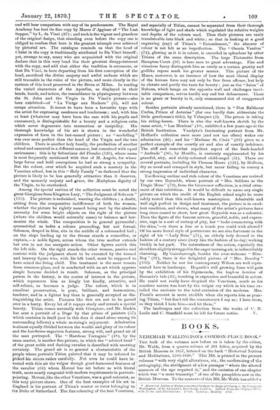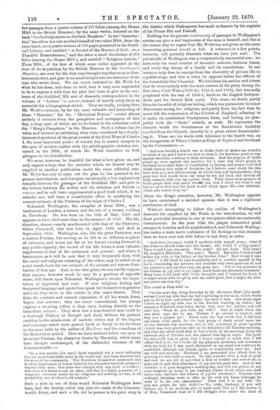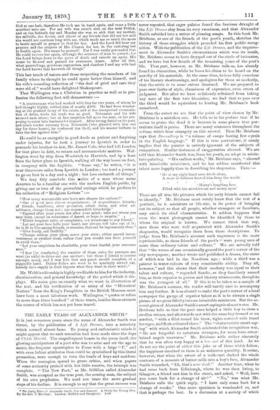BOOKS.
NEHEMIAH WALLINGTON'S COMMON-PLACE BOOK.* THE bulk of the volumes now before us is taken by the editor, Mr. Webb, from a quarto volume of 281 folios, acquired by the British Museum in 1857, lettered on the back " Historical Notices and Meditations, 1583-1646." This MS. is printed in the present volumes "with very slight alterations, viz., the modernizing of the orthography, the abridgment of a few passages " where the altered manners of the age required it," and the omission of one chapter which was" a mere transcript" of one of the pamphlets now in the British Museum. To the contents of this MS. Mr.Webb has added a • Historical Notaes of Emig occurring Chirfly in The Reign of Charter I. By Nehemiah Wallington, of St Leonard's, Eaxteheap, Lyndon. Edited from the Original MSS., with Notes and Illustrations. 2 vols. London : Bentley 1869.
few passages from a quarto volume of 107 folios (among the Sloane MSS. in the British Museum), by the same writer, lettered on the back "God's Judgements on Sabbath Breakers." In his "Introduc- tion" the editor has also availed himself of two other MSS., from the same hand, one a quarto volume of 518 pages preserved in the Guild- hall Library, and entitled " A Record of the Mercies of God ; or, a Thankful Remembrance," and the other a small duodecimo of 209 folios (among the Sloane MSS.), and entitled " Religious Letters." These MSS., of the first of which some notice appeared at the
time of its acquisition by the British Museum in the Gentleman's Magazine, are now for the first time brought together so as to illus-
trate each other, and give us uo small insight into the character of the man who wrote them. We are much indebted to Mr. Webb for what he has done, and done so well, that it may seem ungrateful
in fin to express a wish that his plan had been to give us the con- tents of the Guildhall MS. and of domestic correspondence in the volume of " Letters" in extenso, instead of merely using them as materials for a biographical sketch. They are really, judging from Mr. Webb's extracts, by far the most valuable and interesting of
these "Remains," for the " Historical Notices " consist almost entirely of extracts from the pamphlets and newspapers of that day, a large part of which are to be found in the collection called the " King's Pamphlets " in the Museum. Such a volume has its value and interest as exhibiting what were considered by a deeply-
interested spectator of the great events of the Civil Wars of Charles I. the most important points of record, but it cannot compete in the eyes of modern readers with the autobiographic sketches con-
tained in the MSS., of which Mr. Webb tantalizes us with glimpses in his introduction.
We must, however, be thankful for what is here given us, and only express a hope that the omission which we lament may be supplied in another publication under the same editorial care. Mr. Webb has only to carry out the plan he has pursued in his
.present introduction, and interpose occasionally a few explanatory remarks between the Massages of the Guildhall MS., and give us the letters between his author and his relations and friends in extenso, and he will have supplemented a good work which, if we mistake not, will have a considerable effect in modifying the current estimate of the Puritans of the reign of Charles I.
Nehemiah Wallington, the compiler of these MSS., was a tradesman of London, a turner, and the son of a turner, residing in Eastcheap. Ile was born on the 12th of May, 1598, and appears to have died some time in the summer of 1658. His life, therefore, almost exactly synchronized with that of the Protector, Oliver Cromwell, who was born in April, 1599, and died in September, 1658. Wallington, also, like the great Protector, was
a zealous Puritan, but moving as he did in so different a sphere of existence, and never (as far as we know) coming forward in
any public capacity, the record of his life forms a most valuable supplement to that of the statesman and general ; and where it harmonizes, as it will be seen that it very frequently does, with
the social and religious colouring of the other, may be relied on as a not unsafe basis for our estimate of the earnest and sincere Puri-
tanism of that age. And, in the first place, we can hardly suppose that anyone, however much he may be a partizan of opposite views, will throw upon Nehemiah Wallington's entries the itnpu- - tatiou of hypocrisy and cant. If ever religious feeling and Scriptural language and quotations speak for themselves as genuine .and real, they do so iu the entries in this man's diaries. They -form the constant and natural expression of all his wants, fears, hopes, and sorrows ; they are never conventional, but always express a meaning (often a deep one), bearing directly on the immediate subject. They show how a true-hearted man could be a thorough Puritan in thought and deed, without his portrait exciting in the minds even of modern critics any of the disgust and contempt which were poured forth so freely on his brethren
in the same faith by the author of Hudibras and the comedians of the Restoration period. Here we have realized before our eyes, in an actual Puritan, the character drawn by Macaulay, which many
have thought overcharged, of the disbanded veterans of the Commonwealth :—
" In a few months [he says] there remained not a trace indicating that the most formidable army in the world had just been absorbed into the mass of the community. The Royalists themselves confessed that in every department of honest industry the discarded warriors prospered beyond other men ; that none was charged with any theft or robbery ; that none was heard to ask an alms; and that if a baker, a mason, or a waggoner attracted notice by his diligence and sobriety, ho was, in all probability, one of Oliver's old soldiers."
Such a man as one of these would Nehemiah Wallington have been, had his destiny called him into the ranks of the Common- wealth Army, and such a life did he pursue in his quiet shop in the district which Shakespeare has made so famous by the exploits of his Prince Hal and Falstaff.
Nothing but the perusal continuously of passages in Wallington's entries can give a real impression of the man in himself, and this is the reason why we regret that Mr. Webb has not given us this most interesting personal record in full. A reference to a few points, however, will partially illustrate what we have just said. The private life of Wallington was a comparatively uneventful one ; we have only the usual number of domestic sorrows, business losses, and every-day doings of a family and its connections. In one instance only does be emerge from the obscurity of private life to a public stage, and this is when he appears before the officers of the formidable Star Chamber. We find from his entries and letters that he went entirely with the main current of his party during the first three Civil Wars (1639-40, 1642-6, and 1648), but was sadly perplexed with the war of 1650-1, between the English Indepen- dents and the Scotch Kirk party. This arose, no doubt, partly from his breadth of religious feeling, which was paramount to minor dissensions among the religious, and partly from the fact that he never left the communion of the Church of England, adhering to it under its established Presbyterian form, and having no sym- pathy with the " Sects " outside, as such. He represents the element which the Government at the Restoration foolishly expelled from the Church, thereby to a great extent denationaliz- ing it. These are his words with reference to the fourth war, on the recognition of Prince Charles as King of England and Scotland by the Covenanters :— " And now behold a fourth war is broke forth (it makes me tremble to think of it), and I know not how to term it, for brethren goeth to war against brethren, contrary to their covenant. And the prayers of God's people go cross against one another; for I hear that God's people in Scotland have their days of humiliation in fasting and prayer that God would destroy this army of Sectaries (as I believe some death the like here with us); and others among us which they call independents, they pray that God would bless our army by sea and land, and destroy all their enemies that rise up against them. Truly these cross prayers of God's people cloth very much trouble me, that I know not what to say but to cry to God that the Lord would think upon His own children, which side soevor they be."
About the King's execution, however, Mr. Wallington appears to have entertained a decided opinion that it was a righteous retribution of God.
Without attempting to follow the outline of 1Vallington's domestic life supplied by Mr. Webb in his introduction, we will draw particular attention to one or two points which are eminently characteristic. In the year 1625 the plague committed great ravages iu London and its neighbourhood, and Nehemiah Walling- ton makes a more naive confession of his feelings on this occasion than we have ever met with before in any diary or letter.
" And thus [he says], would I meditate with myself alone ; what if the sickness should come into this house; who would I willing spare ? Then would I say, the maid. Who next? My son John. Who next ? My daughter Elizabeth. Who next ? Myself. But what if God should strike thy wife, or thy father, or thy brother John ? How would I take it then ? I did think to take it patiently and to comfort myself in the Lord, considering the sorrows and troubles they were gone out of, and the pleasures and joy that they are gone into. • For in thy presence is the fulness of joy, and at thy right hand there are pleasures evermore.' Many tears I did shed with these thoughts, and I desired the Lord, if it might stand with his glory and my soul's good, that I might die first, and never see that day."
The event is thus told --
"On the next day, being Saturday in the afternoon, Ruth [the maid- servant] told my wife that she had a pricking in her neck, winch words put us all in fear, and toward night she went to bed. And about eight o'clock at night my wife was in the kitchen washing up dishes; my daughter Elizabeth then being merry went unto her mother, and said unto her, 'What do you here, my wife ?' And at night when she was abed, says she to me, Father, I go abroad to-morrow, and buy you a plomet pie.' These were the last words that I did hoar my sweet child speak, for the very pangs of death seized upon her on the Sabbath-day morning, and so she continued in great agonies (which was very greivious unto us the beholders) till Tuesday morning, and then my sweet child died at four o'clock in the morning, being the eleventh day of October, and was buried that day at night. The grief for this child was so great that I forgot myself so much that I did offend God in it ; for I broke all my purposes, promises, and covenants with my God, for I was much distracted in nay mind and could not be comforted, although my friends speak so comfortably unto me. And my wife said unto me, •Husband, I am persuaded you offend God in grieving for this child so much. Do but consider what a deal of grief and care we are rid of, and what a deal of trouble and sorrow she is gone out of, and what abundance of joy she has gone into. And do but consider it is your daughter's wedding-day, and will you grieve to see your daughter go home to her husband, Christ Jesus, whore she shall never want, but have the fulness of. joy for evermore? Consider how willingly Abraham went to offer up his only son Isaac, although he were to be his own executioner.' Then said I to my wife, 'Do you not grieve for this child ?'—'No, truly, husband, if you will believe me, I do as freely give it again unto God as I did receive it of Him, forasmuch then as I did struggle thus under the hand of God at one lash, therefore He took me in hand again, and came a little nearther unto mo. For my wife was struck sick on the next Friday, and on the Sabbath day and Monday she was so sick that my mother, the midwife, the doctor, and others of my friends that did see her said she would not continue long with me, which made me so much the more to bestir myself in prayer to God for her. And the Lord did hear my prayers and the prayers of His Church for her, in the restoring her to health again. His name be praised! For I was verily persuaded that He could restore her again, although the sentence of man be passed ; for the Lord brings down to the gates of death and raiseth up again, His name be blessed and praised for evermore. Amen. After all this, what quarrellings, greivions reproaches, and slanders I and my wife had the Lord knows that knoweth all things."
This last touch of nature and those respecting the members of his family whom he thought he could spare better than himself, and his wife's consoling reflection of "the deal of grief and care they were rid of," would have delighted Shakespeare.
That Wallington was a Christian in practice as well as in pro- fession the following fact will demonstrate :—
" A journeyman who had worked with him for two years, of whom he had thought highly, robbed him of nearly £100. He had been wonder- ing at the gradual decay of his estate, and at the unexpected accumula- tion of debts, while his trade was so good. Nehemiah and his wife accused each other; but at last suspicion fell upon the man, on his pro- posing to enter into business for himself. After strong denial on his part, and much tender entreaty from Nehemiah (who pleaded with him one day for three hours), he confessed the theft, and his master forbore to take the law against him."
He could be as energetic in good deeds as patient and forgiving under injuries, for he took a journey to Ipswich in order to persuade his brother-in-law, Mr. James Cole, who had left London for that place in debt, to return and accommodate matters. Wal- lington went by ship from Woolwich to Harwich, and by a boat from the latter place to Ipswich, walking all the way home on foot, in company with the fugitive. " Some say," he writes, " it is near threescore miles from Ipswich to London ; too hard a journey to go on foot in a day and a night : but love endureth all things."
We may fitly conclude this notice of a man whose name deserves to be a familiar one with the modern English public, by giving one or two of the proverbial sayings which he prefixes to his collection of "Religious Letters" :—
"How many warrantable acts have mis-shapen the authors!"
" Out of good men choose acquaintance , of acquaintance, friends ; of friends, familiars ; after probation, admit them, and after ad- mittance, change them not ; age commendoth friendship."
"Expend after your purse, not after your mind ; take not where you may deny, except on conscience of desert, or hope to requite." , "Either frequent snits, or complaints, are wearisome to any friend." `Let not your face belie your heart, nor always tell tales out of it ;
he is fit to live among friends, or enemies, that can be ingenuously close." "Give freely, sell thriftily."
"Change seldom your place, never your state ; either amend incon- veniences, or swallow them, rather than you should run from yourself to avoid them."
"Let your suspicions be charitable, your trust fearful, your censures sure."
"I fear [ho concludes] the number of these rules, for precepts are wont (as nails) to drive out one another ; but these I intend to scatter amongst many, and I was loth that any guest should complain of a niggardly hand. Dainty dishes are wont to bo sparingly served out, homely ones supply in their bigness what they want in their worth."
Mr. Webb's editorship is highly creditable to him for the industry, discrimination, and general knowledge of the period which it dis- plays. His notes give us exactly what we want in illustration of the text, and his verification of so Many of the "Historical Notices" from the King's Pamphlets in the British Museum must have been a most laborious work. Wallington "quotes or refers to more than three hundred " of these tracts, besides those extracts the source of which has not yet been traced.




































 Previous page
Previous page